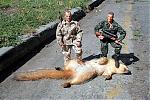South Sudan is now at a turning point. After a UN supported war, the country to be will experience elections in 2010 and a referendum on its independence in 2011.
For the UN, the direction is simple: now it’s time for development, stabilisation in other words.
For the Sudanese, the direction is less clear.
First of all, neither Khartoum nor Juba has interest in going for elections and even less for the referendum. Since last year, South is experiencing a backfire of ethnical violence. Every fingers are pointing to Khartoum, the big bad wolf. But a closer look to those violence shows that reality, as usual, is less simple.
- All clashes started when the SPLM, the political wing of SPLA, started to crack down. The creation of SPLM-DC, a dissident wing of SPLM seems to have been the fire starter.
- All clashes involved, at the early stage, Dinka, the SPLA major ethnic group, and former SAF supporter ethnic groups.
- If Khartoum has advantages to destabilize GoSS, SPLA also has good reasons to undermine the civil SPLM administration. The soldier time is ending and most of them may loose their place in the sun with the elections.
- After nearly 50years of war, traditional social mechanisms are completely dysfunctional. The youth is actually marginalised by the actual in power “mature”/pre elders’ class. As war has destabilise economy and put on their knees most of the population, the actual ruling age class is trying to recover by increasing dotes and traditional transactions. This leads to a de facto marginalisation of the youth that takes guns to recover what they are denied: the right to marry and be a man.
- Education in rural areas is extremely low among men and even lower among girls and women.
- The infamous LRA, the main source of organised violence, has been pushed away in neighbouring countries where they have a safe even in an inaccessible zone. They are now split in dozen of small groups hunted down by at least 3 armed forces.
- Guns and ammunitions are flying around all over the place. Some say it is Khartoum while others are saying, well Khartoum is just fuelling the fire and tacking advantage of the incapability of the GoSS to stabilise and impose law and order.
- While the house is falling apart, GoSS and NPC are preparing for war as rumours of unilateral declaration of independence from South Sudan are becoming the official speech. Not even talking about Darfur.
- Regional powers are looking at South Sudan with a melted opinion on the creation of that non ruled country. Egypt is looking at containing the Muslim Brotherhood and extremist opposition while democratic change could just bring them to power in his old friend North Sudan. Kenyan and Ugandan governments and criminal groups are looking at South Sudan as an open land ready for colonisation.
- The population is 90% rural living on agriculture with average revenues far below poverty level.
The list is long and this one is not exhaustive.
The US interest are not low in Sudan and stabilizing South Sudan is highly necessary for the region.
Somehow, it does remind me other conflicts, without the presence of international forces. As the time is to stabilisation, South Sudan is an open air laboratory for it.
The question is simple: can we just do it? And if yes: how?






 Reply With Quote
Reply With Quote





Bookmarks